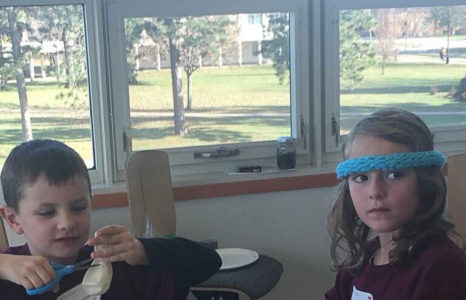This Saturday, young students from the local community will come to campus to take courses taught by students at the College, an opportunity provided by the Ignite program. The program, founded in the fall of 2014, allows Grinnell College students to teach one-day classes on a variety of subjects to children from the community.
In the past, the program has faced criticisms and concerns due to receiving part of its funding from a grant from the Brownell family: Helen Redmond and her husband Pete Brownell, owner of Brownell’s Inc. and former National Rifle Association (NRA) president.
This year, 43 students will teach 13 classes aimed at students aged from kindergarten to fourth grade. Students teaching in the once-per-semester program, which is free for students from the community, design their own lesson plans and apply to have them become Ignite courses.
The program is open to students from all over Iowa, though the majority come from Poweshiek county. According to Ignite director Sarah Smith, the program provides enriching experiences for all who participate, including giving college students the opportunity to interact with children from the local community, as well as allowing local kids to meet college students from a variety of backgrounds and explore new subject areas.
Elyse Salpekar and Moya Roarty, both ’19, are the student directors for this year’s program. As first-years, Salpekar and Roarty taught a cooking class together through Ignite. The next year, both worked as student coordinators for the program with then student director Mollie Jo Blahunka ’17, becoming directors the following year.
The role of a student director, according to both, is to help the student-teachers get ready in time for the big day, as well as making sure that everything runs smoothly during the event itself.
“We work with them to fine-tune their lesson plans, work out the supplies, stuff like that,” said Salpekar.
With the event coming up, she said, much of the work involved preparations that will ensure that everything goes as planned, including packing up supplies and checking in with student-teachers. Roarty added that, although directors don’t teach classes, they do have an on-call status during the event, so that student-teachers have a resource to call if they run into an issue.
Roarty explained that there have been a few changes in how the program has been run since its founding. Although the education department used to be in charge of Ignite, they have handed it over to the Office of Community Enhancement and Engagement. “I think that led to a sort of loss of momentum, just with the organizational switch, and I think we’re starting to regain that,” said Roarty.
She also mentioned that being able to work with another student director had facilitated the process this year. “Elyse and I were both abroad, opposite semesters, last year, and worked on it ourselves …with [two coordinators], we’ve been able to garner some more enthusiasm about Ignite this semester, and have a really diverse array of classes – we’re offering a lot of classes, and college student involvement with it has gone up.”
An additional change to the program this year is in its funding: the grant from the Brownell family, which had previously provided money for the program, has run out, and the program leaders do not plan to use them as donors any longer.
Roarty said that the increased number of classes this semester will allow more local kids to get involved, since each class has an enrollment cap and most fill up fairly quickly. In addition, she said, having a wider variety of classes available appeals to a greater number of children, increasing the program’s overall engagement with the community.
Salpekar also commented on the diversity of classes available this year. “Topics range from science to mythology … It’s a fun day.” She added that in feedback surveys given to parents after the program, responses were overwhelmingly positive.
Salpekar noted that though many students who participate are interested in a career in education, not all of them are. “We put it out as a good opportunity to have teaching experience and have fun with kids from the community, and to connect with the community.”

Photo contributed



















































